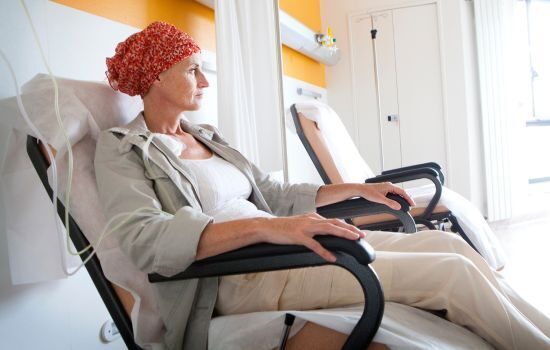Important Traffic Notice: Due to road construction on Southwest Highway directly in front of our office building, traffic may be heavier than usual. Please plan ahead and allow extra time to arrive safely. Thank you for your patience and understanding!
March 13, 2024
Preparing for and Managing the Side Effects of FOLFOX Treatment for Colorectal Cancer

Treatment for colon and rectal cancers (colorectal cancers) often includes chemotherapy. Many colorectal cancer patients experience side effects after they begin chemotherapy treatment. Side effects are mostly short-term, ending after treatment is complete. However, some side effects are long-term and may become permanent.
The side effects of colorectal cancer treatment depend on several factors, including how far your cancer has spread outside the colon, the type of treatments you receive, your age, and your overall health before treatment. The chemotherapy used for many colorectal cancer patients, called FOLFOX, tends to produce the most side effects. It’s helpful to know what you could experience and how to reduce or manage them.
Colorectal Cancer Chemotherapy Side Effects
FOLFOX is usually a 48-hour infusion of several drugs at once. Most other types of chemotherapy only require a few hours of infusion at the cancer center. Because FOLFOX treatment is intense, most patients experience some of the following:
Neuropathy
The drugs in FOLFOX can damage your nerves, especially in your hands and feet, which leads to peripheral neuropathy. This is a tingling sensation, burning sensation, or numbness. This can cause hypersensitivity to cold temperatures. Neuropathy often increases with additional chemotherapy treatments.
You can prepare for the effects of neuropathy by reducing exposure to cold weather and avoiding cold objects. For example, keep gloves or a hot pad by the refrigerator to protect your hands when touching cold items. Due to the harsh winters in Chicago, you should always wear protective clothing, such as a hat, scarf, and gloves, whenever you go outside.
Fatigue
Feeling tired is perhaps the most common side effect of FOLFOX. It can also be a result of surgery, radiation therapy, and chemotherapy. This level of fatigue is more than just feeling very tired. It can cause exhaustion that keeps you from your daily activities. You may need help from someone else to complete basic tasks, even with frequent breaks.
Prepare for fatigue by understanding that you may have less energy during your treatment period. In most cases, this exhaustion is temporary, as most patients return to their normal energy levels after treatment ends. Be patient with yourself, it can take several months for your regular energy levels to return. And be frank with your family about the help you need.
Try to be active. Even moving for 15-20 minutes will help improve your energy levels. This will keep you strong both physically and mentally. In addition, good nutrition is important to manage fatigue. Consuming well-balanced meals, snacks, and non-caffeinated beverages can help you feel stronger.
Stomach and Bowel Issues
Chemotherapy can affect how your body digests food. Follow your oncologist’s recommendations on what to eat during and after your chemotherapy treatments. It’s important to get the nutrients you need, even if you’re experiencing stomach issues, such as nausea and vomiting.
Many patients experience changes in bowel movements, including constipation and diarrhea. Sometimes, this is also related to the side effects of surgery. Other gastrointestinal side effects may include gas, bloating, and cramping.
Stock up on the foods your cancer care team recommends to help your stomach manage the effects of the chemo treatments. Drink plenty of fluids, but avoid sugary soft drinks and fruit juices. Water, 100% fruit juices, beverages with electrolytes, and other non-caffeinated beverages are best. Coffee, strong tea, or other caffeinated drinks, as well as alcohol, can cause dehydration, so try to avoid them. Choose mild foods and avoid fried, greasy, or spicy foods. Eat and drink slowly if you’re having nausea.
In addition, maintain good posture and sit upright for two hours after eating. You may want to keep over-the-counter stool softeners and laxatives on hand. You can also talk to your oncologist about anti-diarrhea and anti-nausea medicines.
Loss of Appetite
Chemotherapy can reduce your appetite or change how food tastes and smells to you. You may not have an appetite if you develop nausea and vomiting. Dehydration can be a concern if your body is not able to absorb the liquid from the foods you eat. Because of this, your doctor may suggest a hydration IV.
Eating foods that are easy to digest and drinking plenty of water are essential steps to avoid dehydration. Dehydration can make your treatment and recovery more difficult.
Prepare for a possible loss of appetite by buying healthy foods and beverages. Eat smaller meals and eat healthy snacks, such as yogurt, hummus, and pudding between meals.
Sores in Mouth
Chemotherapy may lead to sores developing on the soft tissue inside your mouth, including the tongue, inside of the cheeks, lips, and gums. These sores can be painful and make it difficult to eat and talk properly.
If you experience sores as a result of colorectal cancer chemotherapy, your doctor may prescribe a coating solution that protects the inside of your mouth and relieves pain. However, there are also simple steps you can take, such as practicing proper dental hygiene, avoiding smoking, and eating a well-balanced diet.
Anemia
FOLFOX chemotherapy, as with most types of chemotherapy, often leads to anemia. This condition can make you feel weak and dizzy because of a reduced number of red blood cells in your body.
Your oncologist will test your blood before and possibly after each round of treatment. If they see your red blood cells are too low, a transfusion may be needed. If your red blood cells aren’t too low, try to get rest, stand up slowly, and make sure you have assistance with moving around, if needed. In addition, eat a diet rich in iron, as this will help increase your red blood cell count. This includes foods like lean red meats, spinach (cooked), nuts, and eggs.
Rash or Dry Skin
During your chemotherapy treatment, you may notice changes to your skin, such as dryness or rashes. Your skin may also be more sensitive to the sun and burn more easily.
Wear high-factor sunscreen and moisturize your skin regularly with an unperfumed moisturizer.
Weakened Immune System
Chemotherapy may affect your immune system, as the treatment damages both cancer cells and healthy cells, including immune system cells. This damage can increase your risk of infections. A common infection for colorectal cancer patients is mucositis, a painful inflammation in the digestive tract.
Prepare for immune system problems by talking with your colorectal cancer specialist about your risk of developing mucositis after treatment begins. Your oncologist may prescribe filgrastim, which boosts your body’s white blood cell production. In addition, remember to wash your hands regularly, avoid contact with sick people and crowds, and maintain a healthy diet.
Hair Thinning
Thinning hair is a common side effect of FOLFOX chemotherapy. However, this is usually temporary, and your hair will most likely grow normally after treatment ends.
In order to prepare, be gentle with your hair and scalp when combing or brushing it. Use a gentle shampoo, reduce the frequency of hair washing, use conditioner, and avoid hair dryers. Because your head is likely to be sensitive to cold during FOLFOX treatments, be sure you have hats to wear, even if you’re indoors with air conditioning.

Long-Term Side Effects of FOLFOX Colorectal Cancer Treatment
Most side effects will improve after your chemotherapy treatment ends. However, others may be more permanent, such as neuropathy. Some symptoms, especially fatigue and bowel problems, can last up to a year after treatment. Your colorectal cancer doctor may also prescribe physical therapy to help manage side effects.
Expert Colorectal Cancer Care and Treatment in South Chicago
If you have received a colorectal cancer diagnosis, you need a highly skilled and caring staff of experts, like those at Affiliated Oncologists’ treatment centers in the South Chicago suburbs.
Always talk with your oncologist and infusion-room nurses about any problems. Tell your care team immediately if you develop any new symptoms. If you feel anxious or are having mental health issues, don’t hesitate to talk with your cancer care team about that as well. They can provide practical advice to help you manage side effects.
At Affiliated Oncologists, we provide the latest colon cancer treatment technologies at locations throughout South Chicago. We have treatment facilities in Chicago Ridge, Hazel Crest, Mokena, and Orland Park, Illinois. We’ll be with you throughout your treatment and recovery.
Categories: Colorectal Cancer